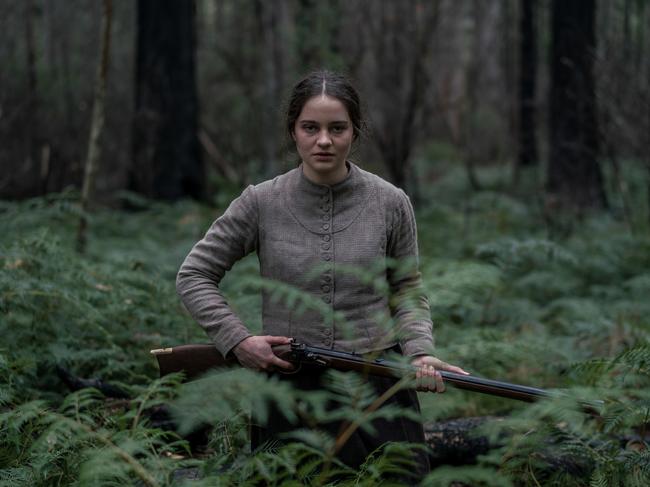Revenge drama The Nightingale woefully misrepresented by controversy
This is a powerful and unflinching exploration of aspects of our history that most of us would rather to forget — from a distinctive, female perspective.
Movies
Don't miss out on the headlines from Movies. Followed categories will be added to My News.
THE NIGHTINGALE
Three and a half stars
Director: Jennifer Kent
Starring: Aisling Franciosi, Baykali Ganambarr, Sam Claflin
Rating: CTC
Running time 136 minutes
Verdict: A female revenge drama that rewrites our colonial past
This historical revenge drama, set in early 19th century Tasmania, has been woefully misrepresented by the controversy that preceded its release. Sure, the rape sequences are brutal — it’s hard to imagine how else a filmmaker might have portrayed such a toxic abuse of authority and power — but they are neither gratuitous nor graphic.
While the use of sexual violence as a weapon of war is only now being widely documented,
it’s a practice that goes back centuries.
Perhaps writer/director Jennifer Kent’s uncompromising exploration of this little-explored aspect of our colonial past it what caused such offence to the small portion of the Sydney Film Festival audience that walked out during early screenings.
If so, they made the classic mistake of shooting the messenger.
Gender politics are also at play here.

There have been no reports of seats being vacated during Quentin Tarantino’s Once Upon A Time in Hollywood… in which Brad Pitt pulps a woman’s skull on a mantelpiece. Or Mel Gibson’s Dragged Across Concrete, in which violent criminals humiliate a female
hostage. What marks The Nightingaleapart is Kent’s conscious focus on the victim/protagonist during the course of her terrifying ordeal — the camera remains on Clare’s (Aisling Franciosi) face for what feels like eons.
We see the light go out of her eyes as the malignant British lieutenant Hawkins (Sam Claflin) and his noxious offsider Ruse (Damon Herriman) destroy everything she holds dear.
The unremitting horror of this sequence is necessary to explain Clare’s extreme metamorphosis in the scenes that follow from young wife and mother to unhinged avenger.

Engaging the services of an Aboriginal tracker, Billy (Baykali Ganambarr), she pursues Hawkins and his team deep into the Tasmanian wilderness in a quest for justice and retribution. Kent doesn’t hold back in her portrayal of the treatment of the country’s indigenous inhabitants — two Aboriginal men swing by nooses from neighbouring trees in an image more familiar from America’s Deep South; another group is shot in cold blood while shackled together in a line. Nor is there any sense of satisfaction or catharsis when Clare finally catches up with one of the perpetrators.

The Nightingale is a powerful and unflinching exploration of aspects of our history that most of us would rather to forget — from a distinctive, female perspective.
For all the reasons listed above, it’s an important Australian film. But it’s not nearly as fertile a piece of storytelling as Kent’s groundbreaking 2014 horror film The Babadook. Kent’s directorial debut was built on layers of subtext. Her follow-up is direct almost to the point of didacticism.
A more nuanced portrayal of good and evil might have gone a little deeper.
Opens Thursday
Originally published as Revenge drama The Nightingale woefully misrepresented by controversy


